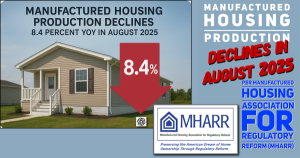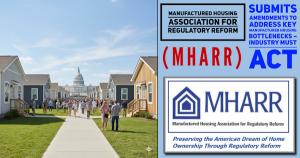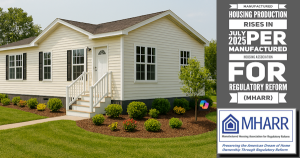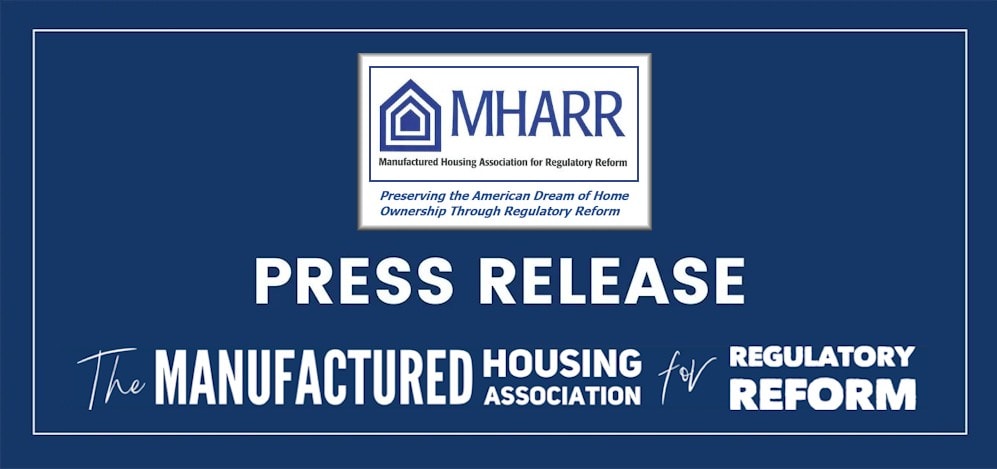
FOR IMMEDIATE RELEASE Contact: MHARR
(202) 783-4087
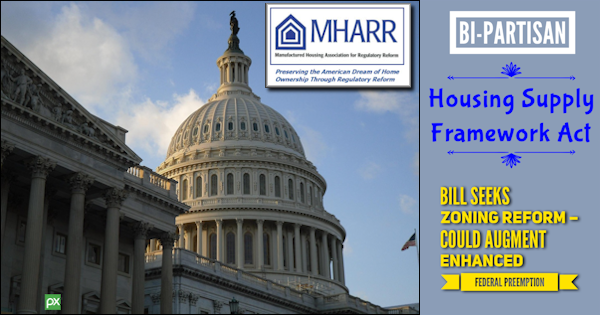
Bi-Partisan Housing Supply Framework Act Bill Seeks Zoning Reform – Could
Augment Enhanced Federal Preemption
Washington, D.C., April 22, 2025 – The Manufactured Housing Association for Regulatory Reform (MHARR) reports that a bill recently introduced in both houses of Congress (S. 1299/H.R. 2840) by a bi-partisan group of lawmakers (see, copy of Senate bill attached), could potentially benefit manufactured housing consumers and the federally-regulated manufactured housing industry in relation to discriminatory zoning exclusion. Although the bill, the Housing Supply Frameworks Act (HSFA), is generally positive from a HUD Code manufactured housing industry perspective, it’s impact, if enacted, could be limited in that it is not mandatory – i.e., it would not, per se, require the removal or modification of zoning barriers to manufactured homes. Further, it contains certain language and scope deficiencies in relation to HUD code homes that will need to be addressed and corrected during the legislative process.
On the positive side, the bill would not negate, prevent or interfere with enforcement of the enhanced federal preemption of the Manufactured Housing Improvement Act of 2000 (2000 Reform Law) to preempt exclusionary zoning edicts, which must remain the ultimate objective of the entire manufactured housing industry. The bill, however, if enacted, could be used to augment the enhanced preemption of the 2000 Reform Law and would potentially begin to address the zoning exclusion that has suppressed the HUD Code manufactured housing industry, even though it would not be sufficient – in and of itself – to fully remedy this chronic bottleneck (see, MHARR May 2, 2024 News Release entitled, “Bottlenecks Suppressing Manufactured Housing Industry Continue Unabated”). As a result, while the industry would be warranted in supporting HSFA, it must continue to aggressively seek enforcement of the 2000 Reform Law’s enhanced preemption provision to eliminate discriminatory zoning exclusion.
At its core, the HSFA bill would establish a federal mechanism to – within three years of enactment — “develop frameworks for best practices on zoning and land-use policies” at both the state and local level. Among other things, the bill specifically references a “reduction of obstacles to a range of housing types at all levels of affordability, including manufactured and modular housing.” In addition, the legislation would provide local and state governments with resources to confront barriers to housing development and construction.
Significantly, the bill specifically references and applies to “affordable housing” – not the meaningless term “attainable” housing (promoted by the Manufactured Housing Institute and a few others) – and expressly defines “affordable” housing as “housing for which the monthly payment is not more than 30 percent of the monthly income of the household.” This is notable for at least two reasons. First, it affirms the continuing relevance and importance of advancing manufactured housing as “affordable housing” – a specific defined statutory term that is used not only in the 2000 Reform Law and HSFA, but in other federal legislation and regulatory provisions. Second, it illustrates the recklessness of using meaningless, undefined terms such as “attainable housing” and/or “off-site housing” (as contrasted with “affordable” or “factory-built” housing) while needlessly abandoning (and sacrificing) the industry’s unique claim and status as the nation’s most affordable, non-subsidized type of housing.
Yet another issue that should be addressed is the HSFA’s pairing of “manufactured” and “modular housing” in one provision (i.e., section 4(c)(2)(G) of the attached bill). Given:
(1) The unique non-subsidized affordability of manufactured housing in relation to all other types and forms of housing;
(2) The fact that manufactured homes – unlike all other types of housing — are constructed in accordance with a unique preemptive federal code and federal enforcement standards; and
(3) The fact that many jurisdictions target HUD Code manufactured homes for discriminatory zoning exclusion specifically because of their construction in accordance with a federal code that ensures their affordability but differs from state and/or local building codes for all other types of site-built and factory-built housing manufactured homes should be addressed separately as a unique and defined category of federally-regulated “affordable homes” to be protected from discriminatory and exclusionary zoning mandates under HSFA.
In sum, these and other language issues within HSFA are a reflection of the chaos and confusion that has been unleashed on the HUD Code industry through the use of careless terminology by MHI and a few others. As MHARR has noted previously, the template of inherent “affordability” is an industry strength, both legislatively and with respect to policy, and must not be sacrificed for other illusory notions. Thus HSFA provides an opportunity for the industry to eliminate meaningless, subjective and undefined or ill-defined jargon (such as “attainable” and “off-site”) from its lexicon.
In accordance with the foregoing, MHARR will closely monitor the HSFA bill and will seek appropriate modifications going forward.
The Manufactured Housing Association for Regulatory Reform is a Washington, D.C.- based national trade association representing the views and interests of independent producers of federally-regulated manufactured housing.
— 30 —









